
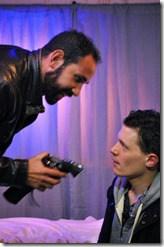
Some brilliant moments exist within mostly underwritten world-premiere

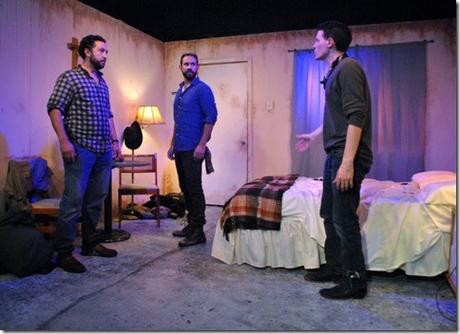
Review by Lauren Emily Whalen
The climactic moment of Tres Bandidos is tense and anxiety-inducing. A major secret has just been revealed. There's more than one gun. It's very, very likely that at least one of the three characters isn't making it out of the hotel room alive. I hunched forward, hands over my ears in anticipation of the promised gunshots, breathlessly wondering what would

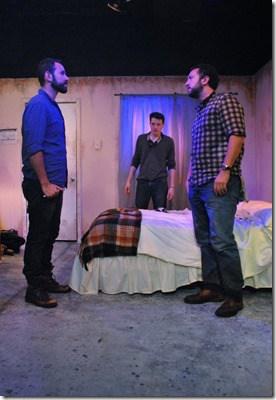
If only the first 65 minutes had carried one-tenth of that tension.
A recurring problem with world premiere plays: they're often not quite ready to go up. Often, program notes by the playwright and director (in this case, directors) are bursting with passion, burbling about inspiration and honor and so forth. But in the case of Tres Bandidos , and many before it, the play itself still feels like a work in progress, and its archetypal characters and lack of buildup render a play lukewarm when it should be red-hot.
Jeff-nominated playwright also plays Luke, a young buck from Texas who's joined forces with ex-addict David (Joe Lino) and disgraced former cop Shep (Guy Wicke) to rob a bank. Unfortunately, the trio gets lost during a storm and are forced to check into a seedy motel and wait it out. Tres Bandidos is meant to be a rapid-fire, amped-up look at toxic masculinity, and what really happens when three near-strangers and would-be criminals are stuck together in a very small space. This logline promises a ticking time bomb of repressed anger, set off in the first two minutes as David paces, flipping his burner phone and sucking on an electronic cigarette while a nervous Luke fumbles for his phone charger.
Instead of being drawn into this tense energy, I found myself tuning out when I should have been riveted by these three men, the crime they had yet to commit, and the game of Texas Hold 'Em whose stakes are way higher than the dollar buy-in. A slower pace isn't necessarily an issue, but directors Cordie Nelsonand Jack Schultz fail to heighten the characters' apprehension and friction with one another. It doesn't help that Lucas doesn't allow the characters to shift dynamics or have any real arc. From beginning to end, they're predictable: the drinker with a flask full of secrets, the powder keg with a hair-trigger temper, the dumb kid along for the ride. Even in a masculine environment where no one's going to willingly share their feelings, alliances will form and nuances will emerge. Maybe another pass at the script could have solved this problem. Maybe not.

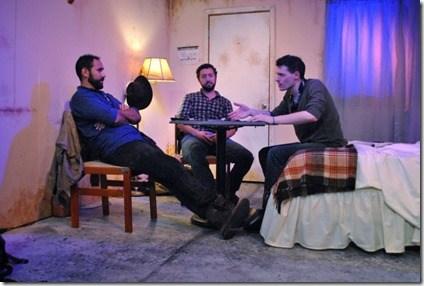

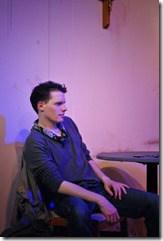

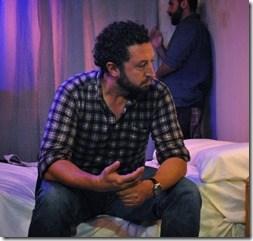

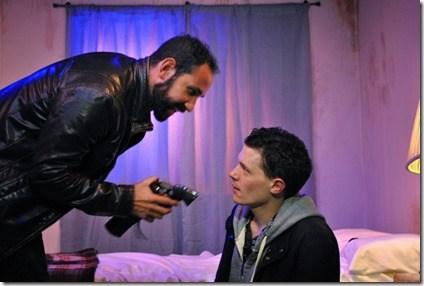
Besides the climax and opening two minutes, there are small, brilliant directorial moments: from the moment Shep swaggers in, cool as a cucumber with a holster comfortably on his hip, we know exactly who he is and what he's about. When Luke earnestly defends the film "Butch Cassidy and the Sundance Kid," Shep and David exchange a loaded look that clearly reads, "wow, he's clueless." (It helps that Lino and Wicke are phenomenal actors, settling into their roles with ease and professionalism. Lucas, however, doesn't measure up: his dialect doesn't feel specific or natural, and he seems to judge his character the entire time.) Sadly, Directors Nelson and Schultz seem to have concentrated all of their energy into the play's final moments, rather than amping up every gesture and glance. Extra direction of Lucas would help too.
What's saddest about Tres Bandidos is its naivete. Writing characters with different life experiences than oneself isn't an issue - people do this all the time, successfully. The trick is to get into your characters' heads and, when necessary and appropriate, do your homework. Lucas doesn't seem to know or care how an addict speaks or thinks, why criminals are driven to make the choices they do, what it's like to be on the verge of parenthood. He doesn't need to experience these personally, but a little googling never hurt anyone. At one point, Shep advises Luke, "Better start paying attention, kid." If only the playwright had taken his own advice.
Tres Bandidos continues through September 15th at Heartland Studio, 7016 N. Glenwood (map), with performances Thursdays-Saturdays 8pm, Sundays 3pm. Additional performances Sept. 2, 10 and 12 at 8pm; September 8 at 2:30pm. Tickets are pay-what-you-can (suggested $15). More information at WeAreTheAgency.org. (Running time: 70 minutes, no intermission)

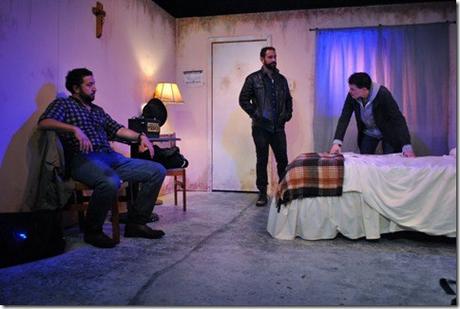
Photos by Katie Reynolds
behind the scenes
Cordie Nelson , Jack Schultz (co-directors), Audrey Gladson (assistant director), Teryl Thurman (stage manager), Ethan Walles (production manager), Ellie Humphrys (lighting design), Marie Weigle (set decoration, executive producer), Cristian Esparza (costume design), Ryan Wiechmann (sound design), Chas Mathieu (set design), Manuel J. Ortiz (technical director), Hannah Tarr (fight choreographer), Edward Karch (weapons master), Susenna Turner, Troy Rumans (marketing assistants), Katie Reynolds (photos)

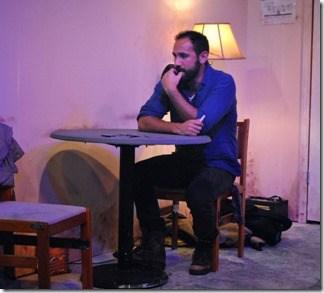

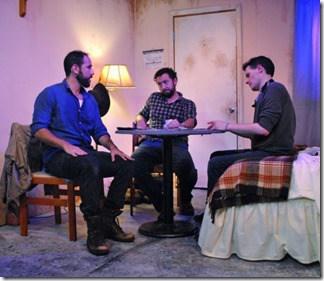
Tags: 18-0812, Agency Theater Collective, Audrey Gladson, Chas Mathieu, Chicago Theater, Cody Lucas, Cordie Nelson, Cristian Esparza, Edward Karch, Ellie Humphrys, Erich Peltz, Ethan Walles, Guy Wicke, Hannah Tarr, Heartland Studio, Jack Schultz, Joe Lino, John Miraglia, Joseph Mangels, Katie Reynolds, Lauren Emily Whalen, Manuel J. Ortiz, Marie Weigle, post, Ryan Wiechmann, Susenna Turner, Teryl Thurman, Troy Rumans
Category: 2018 Reviews, Agency Theater Collective, Drama, Heartland Studio Theatre, Lauren Emily Whalen, New Work, World Premier

